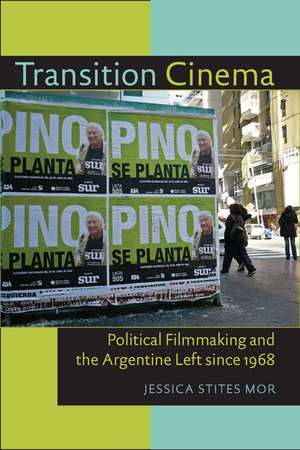Transition Cinema: Political Filmmaking and the Argentine Left since 1968: Pitt Illuminations
Autor Jessica Stites Moren Limba Engleză Paperback – 18 mai 2012
In May of 1976, documentary filmmaker and proclaimed socialist Raymundo Gleyzer mysteriously disappeared in Buenos Aires. Like many political activists, Gleyzer was the target of a brutalizing military junta that had recently assumed power. Amazingly, within a few decades, leftist filmmakers would be celebrated as intellectual vanguards in this same city.
In Transition Cinema, Jessica Stites Mor documents the critical role filmmakers, the film industry, and state regulators played in Argentina’s volatile transition to democracy. She shows how, during different regimes, the state moved to either inhibit or facilitate film production and its content, distribution, and exhibition. She also reveals the strategies the film industry employed to comply with, or circumvent these regulations.
Stites Mor divides the transition period into three distinct generations, each defined by a major political event and the reactions to these events in film. The first generation began with the failed civil uprising in Córdoba in 1969, and ended with the 1976 military takeover. During military rule, repressive censorship spurred underground exhibitions, and allied filmmakers with the Peronist left and radical activists. The second generation arose after the return of civilian rule in 1983. Buenos Aires became the center for state-level cultural programs that included filmmakers in debates over human rights and collective memory campaigns. In 1989, a third generation of filmmaking emerged, with new genres such as cine piquetero (picketer cinema) that portrayed a variety of social movements and brought them into the public eye. By the new millennium, Argentine filmmakers had gained the attention and financial support of international humanitarian and film industry organizations.
In this captivating study, Stites Mor examines how populist movements, political actors, filmmakers, government, and industry institutions all became deeply enmeshed in the project of Argentina’s transition cinema. She demonstrates how film emerged as the chronicler of political struggles in a dialogue with the past, present, and future, whose message transcended both cultural and national borders.
In Transition Cinema, Jessica Stites Mor documents the critical role filmmakers, the film industry, and state regulators played in Argentina’s volatile transition to democracy. She shows how, during different regimes, the state moved to either inhibit or facilitate film production and its content, distribution, and exhibition. She also reveals the strategies the film industry employed to comply with, or circumvent these regulations.
Stites Mor divides the transition period into three distinct generations, each defined by a major political event and the reactions to these events in film. The first generation began with the failed civil uprising in Córdoba in 1969, and ended with the 1976 military takeover. During military rule, repressive censorship spurred underground exhibitions, and allied filmmakers with the Peronist left and radical activists. The second generation arose after the return of civilian rule in 1983. Buenos Aires became the center for state-level cultural programs that included filmmakers in debates over human rights and collective memory campaigns. In 1989, a third generation of filmmaking emerged, with new genres such as cine piquetero (picketer cinema) that portrayed a variety of social movements and brought them into the public eye. By the new millennium, Argentine filmmakers had gained the attention and financial support of international humanitarian and film industry organizations.
In this captivating study, Stites Mor examines how populist movements, political actors, filmmakers, government, and industry institutions all became deeply enmeshed in the project of Argentina’s transition cinema. She demonstrates how film emerged as the chronicler of political struggles in a dialogue with the past, present, and future, whose message transcended both cultural and national borders.
Din seria Pitt Illuminations
-
 Preț: 301.57 lei
Preț: 301.57 lei -
 Preț: 338.21 lei
Preț: 338.21 lei -
 Preț: 388.79 lei
Preț: 388.79 lei -
 Preț: 386.88 lei
Preț: 386.88 lei -
 Preț: 389.76 lei
Preț: 389.76 lei -
 Preț: 433.53 lei
Preț: 433.53 lei -
 Preț: 349.43 lei
Preț: 349.43 lei -
 Preț: 347.87 lei
Preț: 347.87 lei -
 Preț: 462.86 lei
Preț: 462.86 lei -
 Preț: 428.75 lei
Preț: 428.75 lei -
 Preț: 390.71 lei
Preț: 390.71 lei -
 Preț: 426.79 lei
Preț: 426.79 lei -
 Preț: 310.95 lei
Preț: 310.95 lei -
 Preț: 243.01 lei
Preț: 243.01 lei -
 Preț: 384.00 lei
Preț: 384.00 lei -
 Preț: 322.67 lei
Preț: 322.67 lei -
 Preț: 394.94 lei
Preț: 394.94 lei -
 Preț: 391.67 lei
Preț: 391.67 lei -
 Preț: 459.98 lei
Preț: 459.98 lei -
 Preț: 428.36 lei
Preț: 428.36 lei -
 Preț: 390.71 lei
Preț: 390.71 lei -
 Preț: 356.55 lei
Preț: 356.55 lei -
 Preț: 386.88 lei
Preț: 386.88 lei -
 Preț: 386.88 lei
Preț: 386.88 lei -
 Preț: 396.85 lei
Preț: 396.85 lei -
 Preț: 358.46 lei
Preț: 358.46 lei -
 Preț: 290.58 lei
Preț: 290.58 lei -
 Preț: 388.79 lei
Preț: 388.79 lei -
 Preț: 426.63 lei
Preț: 426.63 lei -
 Preț: 423.14 lei
Preț: 423.14 lei -
 Preț: 389.55 lei
Preț: 389.55 lei -
 Preț: 385.91 lei
Preț: 385.91 lei -
 Preț: 384.00 lei
Preț: 384.00 lei -
 Preț: 385.69 lei
Preț: 385.69 lei -
 Preț: 425.86 lei
Preț: 425.86 lei -
 Preț: 386.88 lei
Preț: 386.88 lei -
 Preț: 423.91 lei
Preț: 423.91 lei -
 Preț: 422.76 lei
Preț: 422.76 lei -
 Preț: 427.55 lei
Preț: 427.55 lei -
 Preț: 386.88 lei
Preț: 386.88 lei -
 Preț: 386.88 lei
Preț: 386.88 lei -
 Preț: 390.71 lei
Preț: 390.71 lei -
 Preț: 428.75 lei
Preț: 428.75 lei -
 Preț: 386.88 lei
Preț: 386.88 lei -
 Preț: 438.33 lei
Preț: 438.33 lei -
 Preț: 386.88 lei
Preț: 386.88 lei -
 Preț: 350.79 lei
Preț: 350.79 lei -
 Preț: 384.92 lei
Preț: 384.92 lei -
 Preț: 460.97 lei
Preț: 460.97 lei -
 Preț: 385.91 lei
Preț: 385.91 lei
Preț: 422.00 lei
Nou
Puncte Express: 633
Preț estimativ în valută:
80.76€ • 84.00$ • 66.67£
80.76€ • 84.00$ • 66.67£
Carte tipărită la comandă
Livrare economică 15-29 aprilie
Preluare comenzi: 021 569.72.76
Specificații
ISBN-13: 9780822961918
ISBN-10: 0822961911
Pagini: 304
Dimensiuni: 152 x 229 x 23 mm
Greutate: 0.43 kg
Ediția:1
Editura: University of Pittsburgh Press
Colecția University of Pittsburgh Press
Seria Pitt Illuminations
ISBN-10: 0822961911
Pagini: 304
Dimensiuni: 152 x 229 x 23 mm
Greutate: 0.43 kg
Ediția:1
Editura: University of Pittsburgh Press
Colecția University of Pittsburgh Press
Seria Pitt Illuminations
Recenzii
"An authoritative analysis of some 50 years of Argentine filmmaking in its determinant political contexts."
—Hispanic American Historical Review
—Hispanic American Historical Review
"Jessica Stites Mor offers a welcome revision of Argentine political film of the last four decades that challenges classical approaches to both the history of Argentine cinema and the cinema of the Argentine transition....[she] offers an original and insightful resource to both scholars and a general audience who wish to better understand the unique case of the revival of contemporary Argentine political film."
—Canadian Journal of Latin American and Canadian Studies
—Canadian Journal of Latin American and Canadian Studies
“This well-researched analysis of the past 50 years of Argentine cinema is unique in its emphasis on documentary film as well as feature film . . . an eye-opening perspective on the recent history of one of the world’s most important film producers. Highly recommended.”
—Choice
—Choice
“[Stites Mor's] thorough inquiry into the role of film clubs, film collectives, government institutions, and cinema laws is innovative and interesting; the extensive filmography, selected bibliography, list of archival sources, periodicals, and film publications, will be extremely valuable to Latin American historians and film scholars wishing to delve further into a topic that has yet to yield many more in-depth analyses and critical reevaluations.”
—Latin American Perspectives
—Latin American Perspectives
“Detailed and engaging. . . . It is clear that Stites Mor has spent a number of years researching in Argentina. This offers her an ‘insider’s view’ that is evident on every page, as she deploys a range of primary resources, including difficult-to-trace documentaries, interviews with protagonists of the era, film and political journals and industrial archives. . . [a] work that synthesizes so much information in such an elegant form.”
—Journal of Latin American Studies
—Journal of Latin American Studies
“I find it fascinating how Stites-Mor studies the regular independent Argentinian filmmaking (which started in the Sixties with the name of New Argentinian cinema) including the eclosion of the ‘cine piquetero’ around 2001 and the Argentina financial crisis. The author pays critical attention not only to the traditional cinema, but also to the new phenomenon of the street filmmaking, which created a different kind of cinema.”
—Jorge Ruffinelli, Stanford University
—Jorge Ruffinelli, Stanford University
“This is an original and important contribution to Argentine cultural history. Stites-Mor convincingly reveals the critical impact that filmmakers have made on collective memories, cultural politics, and identity debates in Argentina’s transition from dictatorship to democracy.”
—Raanan Rein, Elias Sourasky Professor of Lain American and Spanish History, Tel Aviv University
—Raanan Rein, Elias Sourasky Professor of Lain American and Spanish History, Tel Aviv University
Notă biografică
Jessica Stites Mor is assistant professor of Latin American history ath the University of British Columbia, Okanagan.
Descriere
Stites Mor documents the critical role filmmakers, the film industry, and state regulators played in Argentina’s volatile transition to democracy. She shows how, during different regimes, the state moved to either inhibit or facilitate film production and its content, distribution, and exhibition. She also reveals the strategies the film industry employed to comply with, or circumvent these regulations.










